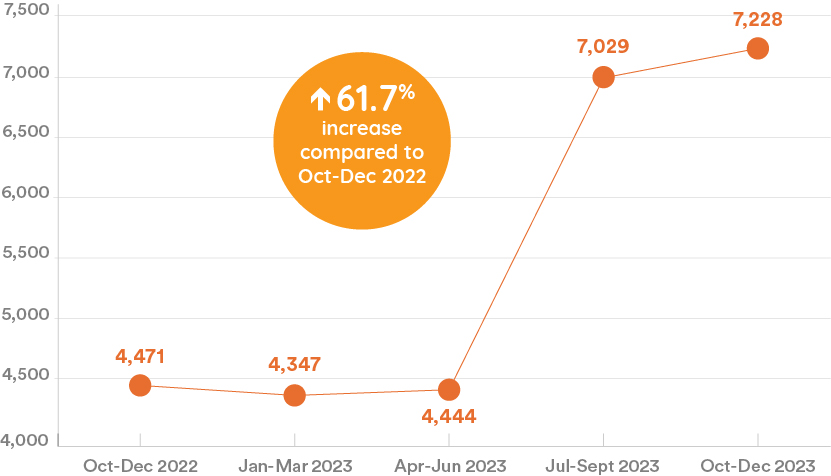Customers are still confused about options and can end up with large charges
The Australian Energy Market Commission (AEMC) published a final report on its review of the regulatory framework for metering services in August 2023. The final report sets out 21 recommendations aimed at accelerating the rollout of smart meters for households and small businesses in the National Energy Market (NEM). Some key recommendations include:
- a target of universal smart meter deployment by 2030
- energy networks to develop and implement legacy meter retirement plans (LMRPs) for approval by the Australian Energy Regulator (AER), with retailers to manage the meter replacements in accordance with the LMRPs
- new obligations for providing up-front and customer-friendly information to help customers maximise the benefits of smart meters
- retailers to provide customers with a 30 business day notification period when transitioning to a different tariff structure
- a ‘one-in-all-in’ approach for shared fuse situations
- improved notification and record-keeping processes for site remediation scenarios such as non-compliant meter boards and the presence of asbestos.
The AEMC will now consult on a rule change request to implement recommendations which require amendments to the National Energy Retail Rules and National Electricity Rules. The AEMC anticipates that it will release a draft determination for consultation in early to mid 2024. EWON will continue to provide our unique complaints insights as we did throughout the review process.
The AEMC’s report acknowledges that there are some barriers to an efficient and equitable smart meter rollout that require further consideration and action outside the scope of its review. For example, it remains a major issue that fixing site defects can come at a potentially prohibitive cost to the customer. Its recommendations to improve notification and record-keeping processes for remediation scenarios will help improve outcomes where a customer has a site issue preventing meter installation. However, as noted by the AEMC, addressing the financial barriers to site remediation requires more industry work and potentially government action.
EWON receives complaints about these barriers to installing smart meters. The first case study is an example of a site remediation scenario where the complaint may have been prevented by better notification and record-keeping processes. In the second case study, improved notification and record-keeping processes would not resolve the main issue – the financial burden of site remediation for the customer.
Case studies
 Confusing information prevents meter installation
Confusing information prevents meter installation
A customer had solar panels installed in July 2023. She arranged a smart meter installation through her retailer, which was scheduled for August 2023. She received a text message from the meter technician and an email from the retailer, both indicating that the meter installation had been unsuccessful as the meter box was unsafe. She contacted the retailer and advised that the meter box was replaced only four years ago. The retailer said that its email was incorrect, and the issue was actually that the meter box was too small to accommodate the new meter. She told the retailer that there were two meters which would be replaced by only one meter, so it seemed strange that the meter box would not be big enough. After further review, the retailer told her that there was an incorrect meter attached to her house and the network would need to come out and inspect. She sent meter photos at the retailer’s request but had to keep following up as she was not getting updates. She often had to explain the whole story again and resend the meter photos.
The customer contacted EWON in early October 2023 as there was still no resolution. The retailer advised EWON that there were two meters at the property but only one meter was listed in the national electricity database and the retailer’s billing system. The customer had only been billed on one meter. It was unclear how the discrepancy had occurred, but it appeared the second meter was not functional.
 In response to EWON’s investigation, the retailer arranged for the network to correct the database based on the meter photos. The new meter was successfully installed on 12 October 2023 and the retailer offered a credit of $250 in recognition of the customer service issues and missed solar credits. The customer was happy with the outcome.
In response to EWON’s investigation, the retailer arranged for the network to correct the database based on the meter photos. The new meter was successfully installed on 12 October 2023 and the retailer offered a credit of $250 in recognition of the customer service issues and missed solar credits. The customer was happy with the outcome.
 Customer unable to afford smart meter installation
Customer unable to afford smart meter installation
A customer asked her retailer to install a smart meter as she was receiving estimated bills. Her retailer said the meter technician could not complete the installation because of safety concerns. The meter box was above door height, which was unsafe for the technician to access and not compliant with meter box positioning requirements. The retailer said this was also why her meter reads were estimated as the network was unable to safely obtain meter reads.
The customer contacted her electrician for a quote to relocate the meter box and found that it would be very costly, as they would need to move it to a different wall and modify the power line from the street. She could not afford the high cost and felt that she would be stuck continuing to receive estimated bills.
 The customer had not spoken to the retailer since obtaining the electrician’s quote, so EWON referred the customer to the retailer’s specialist team to further discuss her options. EWON invited her to return to EWON for further discussion if required.
The customer had not spoken to the retailer since obtaining the electrician’s quote, so EWON referred the customer to the retailer’s specialist team to further discuss her options. EWON invited her to return to EWON for further discussion if required.





